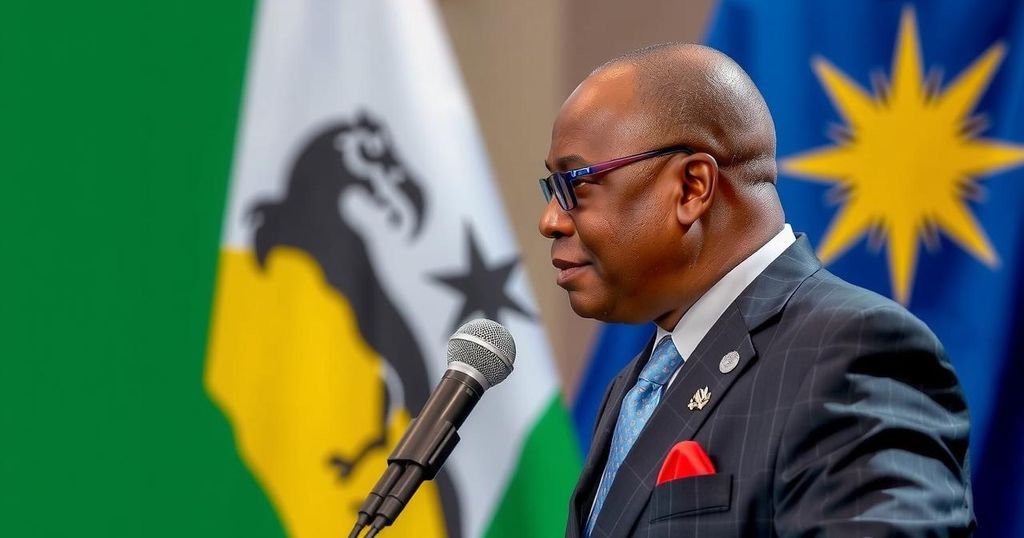Zimbabwe’s New President Duma Boko Welcomes Undocumented Migrants from Botswana

Duma Boko, Zimbabwe’s new President, plans to legalize undocumented Zimbabweans in Botswana by granting work and residence permits to enhance economic recovery. Acknowledging their critical contributions, he seeks to formalize their status, facilitating skills transfer and addressing the challenges posed by irregular migration, marking a new era in Zimbabwean immigration policy.
Duma Boko, the newly inaugurated President of Zimbabwe, has articulated his intention to welcome undocumented Zimbabweans living in Botswana by legalizing their status through the provision of temporary work and residence permits. In a statement to the BBC before his inauguration, he emphasized the importance of these individuals, noting, “They do jobs that would otherwise not get done.” This policy marks a significant shift in Zimbabwean governance given the historical challenges faced by the migrant population, particularly in light of previous deportations. Botswana is home to a substantial community of Zimbabweans, many of whom have sought refuge from economic instability and hyperinflation that have plagued their home country for over two decades. President Boko, who recently ended a prolonged period of one-party rule, views the regulation of migrant workers as a strategic move to invigorate the local economy. He acknowledged the challenges presented by large numbers of undocumented migrants entering Botswana, citing limited access to necessities and the likelihood of illicit activity as sources of community resentment. Data reveal that Zimbabweans represent 98% of irregular migrants in Botswana, with thousands settling there over the past twenty years. From 2021 to 2023, Zimbabweans made up 98.78% of recorded irregular entrants, highlighting the pressing issue of undocumented migrants. President Boko pointed out the essential roles these workers play in the economy, stating, “A lot of these workers from Zimbabwe perform tasks that the citizen finds unattractive.” Despite some public resistance against recent policies aimed at regulating cross-border travel, Boko underscored his plan as a means of fostering mutual benefit. He aims not only to provide legal recognition to undocumented migrants but also to facilitate skills transfer, particularly in trades such as plumbing and welding, where Zimbabweans have demonstrated proficiency. “We need to have them come in properly, come in legally and be rewarded appropriately for the skills that they bring,” he stated, emphasizing the necessity of developing local skill sets while simultaneously integrating Zimbabwean expertise into Botswana’s labor force.
The article discusses the current migration dynamics between Zimbabwe and Botswana, particularly in light of economic factors that have driven many Zimbabweans to seek a livelihood in Botswana. The new Zimbabwean President Duma Boko’s policies reflect a significant departure from previous administrations that often responded to migration with deportation. By addressing the status of undocumented Zimbabweans, Boko aims to integrate these individuals into society while leveraging their skills to benefit the Zimbabwean economy and alleviate labor shortages in Botswana. This move, posed as a solution to enhance bilateral relations and improve economic conditions, is intertwined with the historical context of Zimbabwe’s economic collapse and subsequent migration waves.
In conclusion, President Duma Boko’s approach to undocumented Zimbabweans in Botswana represents a transformative policy aimed at legalizing their status and integrating them into the workforce. By recognizing the contributions these migrants make to both economies, Boko seeks to foster mutual growth while addressing the challenges of undocumented migration. This initiative, which emphasizes skills transfer and proper legalization, stands as a substantial legislative shift, echoing a progressive outlook for Zimbabwean governance in the face of historical adversity.
Original Source: www.theheritagetimes.com







